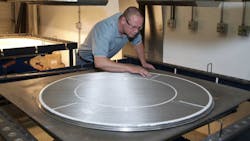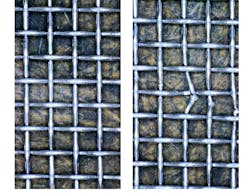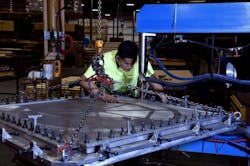Why screen quality is critical for product safety and efficiency in industrial screening
Key takeaways:
-
High-quality screens improve product consistency, reduce downtime, and enhance safety in industrial operations.
-
Regular inspections and proactive screen replacement prevent costly rework and production disruptions.
-
Partnering with reliable screen providers ensures compliance, traceability, and long-term cost savings.
In the world of industrial manufacturing, screen quality plays a pivotal role in determining product consistency and operational safety. From food production to aerospace applications, the performance and reliability of wire cloth screens directly impact the quality, safety, and efficiency of production processes. This article explores the nuances of screen quality, its far-reaching effects on product outcomes, and how businesses can leverage high-quality screens to enhance their operations.
How precision screen quality ensures consistent particle sizing and material compliance
At its core, screen quality governs the precision with which particles are sized and sorted. Whether the application is ensuring uniform particle size in a food process or meeting strict specifications for aerospace materials, a screen's weave pattern, material composition, and structural integrity are critical. Screens with poor structural integrity or inconsistent weaves can result in undersized or oversized particles, leading to out-of-spec process materials. This not only compromises the end product but also necessitates costly rework and can damage customer relationships.
Preventing contamination and hazards: The safety risks of faulty industrial screens
Beyond consistency, screen quality has direct safety implications. For instance, in food processing facilities, broken screens can release fragments into the production line. Consider a hypothetical scenario involving a cereal manufacturer: if a standard stainless steel T304/T316 screen breaks, metal fragments could potentially end up in the product, going undetected. In this case, using T430 stainless steel would be a possible solution due to its magnetic characteristics, which would allow broken or loose wire fragments to be removed from the product using magnetic separation equipment.
In environments where dust, heat, and friction converge — which is common in industries handling powdered materials — screens may be equipped with grounding wires to prevent static discharge and potential explosions. Neglecting this precaution, whether due to poor screen quality or oversight, can lead to catastrophic workplace incidents.
Essential factors defining high-performance wire cloth screens in manufacturing
Several factors determine the quality of a wire cloth screen:
-
Material composition: The alloy used, such as stainless steel types 304, 316, or magnetic 430, influences a screen’s resistance to corrosion and its ability to withstand environmental stresses. For instance, salt-processing facilities often require highly corrosion-resistant materials. In many cases, type 316 may satisfy this requirement, but in some extreme environments Inconel alloys, which are highly corrosion resistant and can withstand high temperatures up to 1,800°F, are used to maintain operational integrity.
- Weave precision: Consistent weaving ensures uniform openings, critical for particle size accuracy. The ASTM E2016-22 Standard Specification for Industrial Woven Wire Cloth provides specifications for wire cloth quality, enabling manufacturers to maintain consistency and traceability from raw material sourcing to finished product delivery.
- Traceability: Manufacturers of high-quality screens implement robust traceability protocols, allowing them to track materials from their origin at the mill to the final fabrication. This transparency not only ensures quality but also enables quick identification and resolution of issues if they arise.
Maximizing uptime and reducing costs with high-quality industrial screening solutions
Investing in high-quality screens is not merely a question of compliance or product excellence — it is also a strategic decision with long-term benefits. Superior screens often outlast their lower-quality counterparts, reducing downtime and its associated costs. For businesses where material costs and operational disruptions are significant, preemptive maintenance based on known screen lifespans can save both time and money. For example, a facility that replaces screens every five to six days, despite a seven-day expected lifespan, minimizes the risk of unplanned downtime — a critical consideration for industries dealing with expensive raw materials.
Moreover, feedback from customers underscores the efficiency gains achieved with premium screens. Reports of increased throughput and longer operational life demonstrate the tangible benefits of choosing quality over cost-cutting alternatives.
Preventative maintenance is the cornerstone of maximizing screen performance. Processors should adopt regular inspection schedules to ensure that screens remain taut and free of defects such as sagging, plugging, or broken wires. These checks not only extend the lifespan of screens but also maintain product quality by preventing issues such as oversized material bypass or product contamination.
Maintenance teams can employ lab sieves to monitor for inconsistencies, enabling early detection of potential problems on the production floor. By addressing issues such as screen blinding — where clogged openings reduce material throughput — processors can maintain operational efficiency and avoid costly rework.
Identifying the right time to replace a screen is vital. Signs such as reduced tension, visible damage, or inconsistent product results during lab tests indicate the need for replacement. In industries where downtime equates to substantial financial loss, proactive replacement strategies often prove more cost-effective than reactive measures.
Selecting the right industrial screen supplier for compliance, traceability, and performance
As industries continue to face increasingly stringent quality standards, partnering with a reliable screen solutions provider becomes paramount. Suppliers like Compass Wire Cloth exemplify the kind of partner that can make a significant difference in industrial operations. Their commitment to quality assurance, with ISO 9001-compliant processes and full traceability, provides processors with the confidence needed in today's demanding manufacturing environment. By offering customized solutions tailored to specific industry needs, from corrosion-resistant alloys for harsh environments to specialized features such as grounding wires for dust-prone settings, they demonstrate the importance of adaptability in screen manufacturing.
Moreover, the value of a screen solutions partner extends beyond the product itself. Technical expertise, preventative maintenance strategies, and proactive replacement schedules are crucial services that can help processors optimize their operations, reduce downtime, and ultimately improve their bottom line. The ability to respond quickly to urgent orders and provide ongoing support reflects a customer-first philosophy that is essential in building long-term partnerships.
As industries continue to face challenges in maintaining product quality, ensuring safety, and improving efficiency, the choice of a screen solutions partner becomes increasingly critical. By prioritizing screen quality and selecting a partner that offers comprehensive support, processors can position themselves for success in an ever-competitive industrial landscape.
About the Author
Christopher Toppi
Christopher Toppi is VP of Sales & Operations at Compass Wire Cloth.
David Gentilini
David Gentilini is National Account Executive at Compass Wire Cloth.


